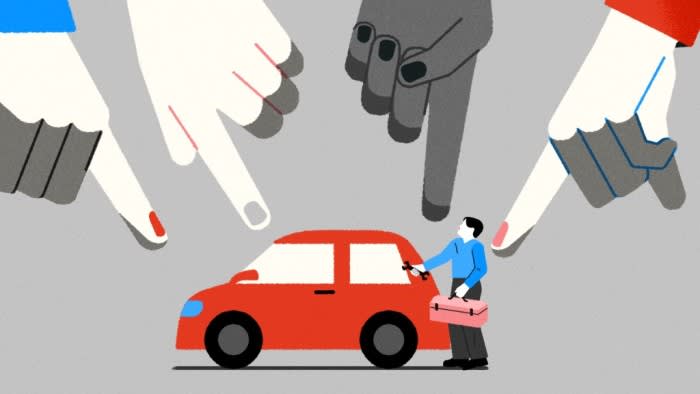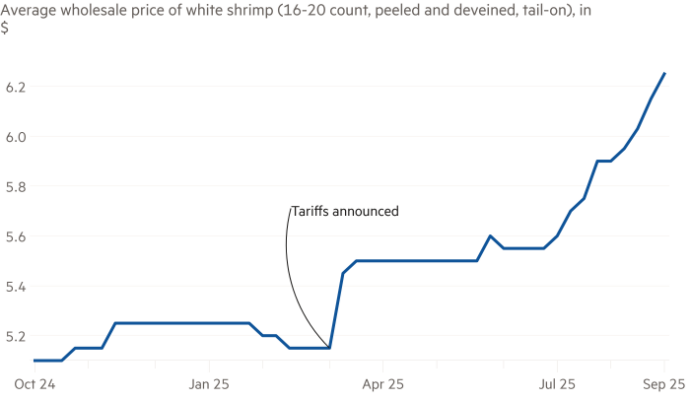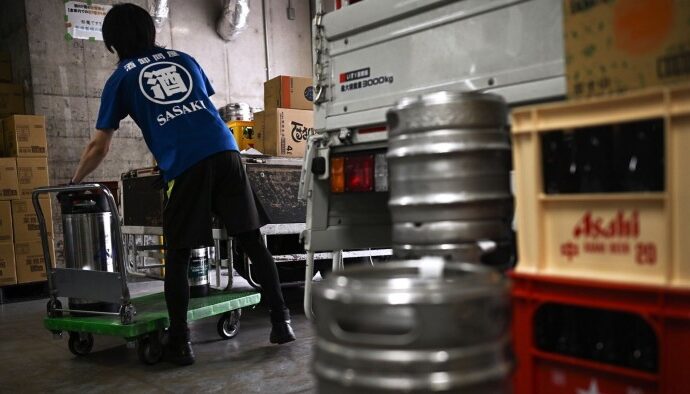
Receive free Japanese society updates
We’ll send you a myFT Daily Digest email rounding up the latest Japanese society news every morning.
Second-hand car dealers, Japan has discovered with horrified delight, are so much more than the fast-talking, mileage-tampering wideboys portrayed in legend. They are also tree-slaying, tyre-stabbing financial conspiracists who bring the noble game of golf into disrepute.
For scandal has erupted in second-hand automotive land. Systematic fraud. Dismay. Tip-of-the-iceberg theorising. Hull-ripping confirmation. Major investigations by police and the financial regulator. Resignations. Tears. Apologies.
Few will admit it in the furore but, from time to time, the nation needs a jolt of villainy exactly like this. Shocking, but somehow stabilising; disgraceful but at the same time affirmative; a perfect pantomime of corporate malfeasatainment.
The mise-en-scène of the current show are the forecourts and back offices of Bigmotor — Japan’s largest chain of combination used car dealerships and repair shops. Bigmotor and its now resigned founder, Hiroyuki Kaneshige, were, for many years, a standout success story: a regional chain grown to national dominance on the claim of good, honest work.
Alas, Bigmotor could not resist the temptation of no-goodery. Some browbeaten repair staff with impossible sales targets appear to have been in the habit of intentionally damaging cars brought in for servicing and claiming the falsely inflated bill on the customer’s insurance. Scratches were extended with screwdrivers and dents created through the judicious deployment of a golf ball in a sock.
An instructional video surfaced over the past few weeks, in which a veteran Bigmotor employee apparently demonstrates how to puncture a tyre so that it may be passed off as general wear. The tabloids have unearthed texts and emails between employees which suggest, to say the least, that the chain was a toxic place to work.
And now Sompo, the giant insurer seemingly defrauded in all this, is under investigation on suspicion of being in on the scam all along and accepting a steady thrum of what it knew were false claims as the price for Bigmotor’s sales staff exclusively pushing its policies on customers. The companies were bound by a shareholding relationship, multiple golden parachutes for retired Sompo executives and a stint of work at Sompo for the Bigmotor founder’s son.
Earlier this month, the president of Sompo Japan Insurance, Giichi Shirakawa, said he would resign. Kengo Sakurada, chief executive of the parent company Sompo Holdings, will shortly be interviewed by the financial regulators.
Then there are the trees. As the scandal grew, authorities around Japan started reporting the absence of trees along the pavements outside Bigmotor branches. Managers, seemingly on orders to ensure that the showrooms could be seen from the roads, have been accused of killing any obscuring greenery by applying massive doses of weedkiller. Last weekend, Bigmotor’s Tokyo headquarters were raided by police. They were there about the foliage.
Are there parables in all of this? Inevitably. Versions of the type of fraud-inducing pressure on Bigmotor staff and managers crop up constantly in corporate scandals at Toshiba, Japan Post, Suruga Bank and more. The country’s ageing, shrinking domestic markets render this pathology chronic. Dire governance and cronyism is equally familiar.
Is there a chance these practices are common between other dealerships and insurers? Of course. Institutional turning of blind eyes? Ditto. Are there structural reasons why customers were being ripped off? Actually, yes. Well-meant regulation that limits the agent commissions on insurance sales also incentivise the type of cheating this scandal has exposed.
But none of this is as important as the wider function of the debacle: the societal good of being collectively shocked while gradually deciding that, although some people’s behaviour is awful, the nation collectively is not like this. We, after all, are horrified. In a newly published analysis of the phenomenon, the Czech academic Igor Prusa describes many scandals in Japan as tantamount to national purification rituals with “restorative powers”.
And, while there are, of course, corporate scandals that involve desperate suffering and criminality, many end up — in terms of the negligible change they bring about — as little more than magnificent spectacle. Corporate malfeasatainment, like any show, keeps the drama strictly theatrical: however huge or small, ridiculous or terrifying the themes. The curtain falls. The stage is swept. Ready for the next performance.


